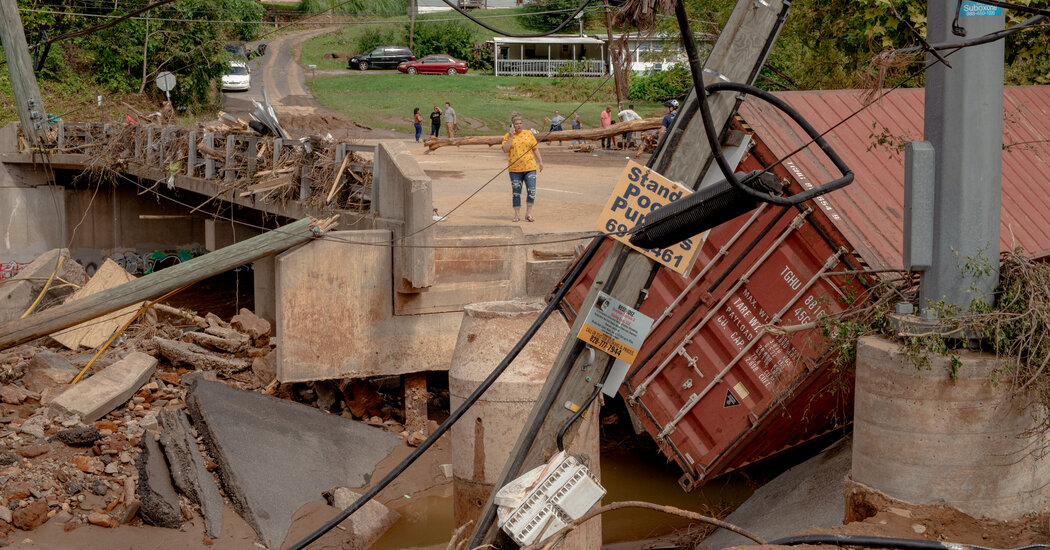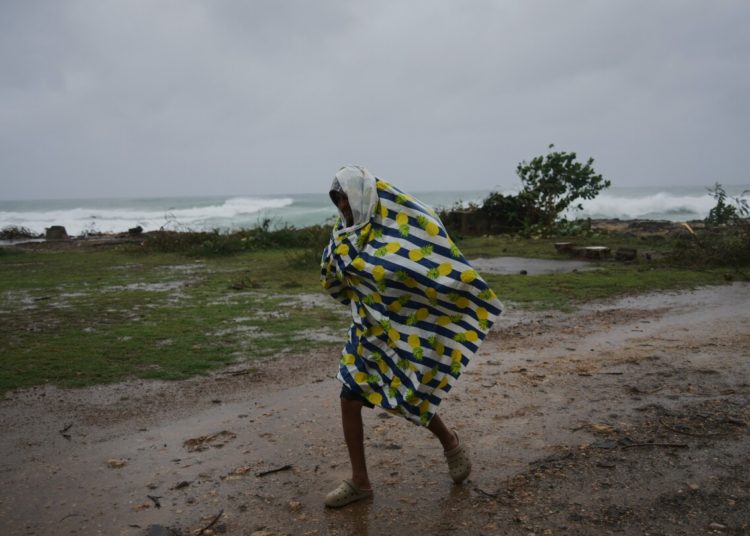States and cities along the Atlantic and Gulf coasts are heading into hurricane season with an extraordinary level of uncertainty, unable to gauge how significant cuts at vital federal agencies will affect weather forecasts, emergency response and long-term recovery.
They are bracing for the likelihood that fewer meteorologists at the National Oceanic and Atmospheric Administration will lead to less accurate forecasts, and that the loss of experienced managers at the Federal Emergency Management Agency will lead to less coordination and more inaction.
Governors and mayors are also anticipating less financial aid, as the Trump administration shifts the burden of response and recovery away from the federal government. Exactly who will pay for what moving forward is a gaping question as disasters become bigger and costlier.
“There’s no plan in writing for how FEMA intends to respond during this disaster season,” said Trina Sheets, the executive director of the National Emergency Management Association, which represents state emergency managers. “Things seem to be changing on a daily basis. But there’s no road map for states to follow or to be able to plan for.”
FEMA did not respond to requests for comment.
The Department of Government Efficiency, the cost-cutting initiative led by Elon Musk, has left agencies that would normally be preparing for a run of extreme weather at this point in the year trying instead to find their footing after leadership changes and staffing cuts.
FEMA has lost about a quarter of its full-time staff, including one-fifth of the coordinating officers who manage responses to large-scale disasters, according to a former senior official. Many of those employees made their own decision to leave. NOAA has lost about one-fifth of its staff, including hundreds of people from the National Weather Service.
The thought of a shrunken FEMA — or eliminating the agency altogether, which President Trump has raised — is unnerving coastal residents like Trasi Sharp, of Sanibel Island, Fla. Her business, Over Easy Cafe, was destroyed by Hurricane Ian in 2022.
“To just get rid of it with no plan is frightening,” Ms. Sharp said of the agency. It took her 18 months to rebuild, and then she lost $60,000 worth of equipment in Hurricane Milton last year, after the low-lying restaurant took on two-and-a-half feet of water. She did not receive FEMA assistance to repair her restaurant or her home, but she said the agency’s debris removal services were essential to the island’s recovery.
“It’s just such a confusing time,” she added. “We’re all on pins and needles this season.”
Kristi Noem, the Department of Homeland Security secretary, whose department includes FEMA, said on Tuesday that the agency was prepared for hurricane season, which extends from June through November. Some of the other federal agencies involved in disaster response agreed, in responses to emailed questions. But the Army Corps of Engineers, which is often called on to help communities after storms, acknowledged that it did not know “the full impact that staff departures or other reductions will have.”
The unknowns extend beyond hurricanes. States and cities in the West, going into peak wildfire season, say they are concerned about how much they will be able to lean on the federal government after the Trump administration reduced the ranks of United States Forest Service personnel who support frontline firefighters.
The domino effect may be that more local firefighters are deployed to help other jurisdictions fight wildfires sooner and for longer — leaving fewer available back at home, Chief Leonard Johnson of the McLane Black Lake Fire Department near Olympia, Wash., said in a news conference this month.
Several state officials in the West said all the uncertainty affirmed their decision to devote more resources to their own firefighting efforts in recent years. “We have made the effort to try to take our fate back,” said Stan Hilkey, executive director of the Colorado Department of Public Safety.
There is no historical comparison, since no other administration has made such deep cuts to FEMA or other disaster-response agencies. In the recent past, the nightmare scenario came in 2017, when FEMA struggled to respond to three devastating hurricanes in quick succession — Harvey, Irma and Maria — as well as widespread wildfires in California. The agency came close to running out of staff to deploy.
At the start of that year’s hurricane season, FEMA had 6,588 trained staff members available to deploy to disasters, according to agency records. As of Wednesday, it had 1,952.
States with robust budgets and considerable experience with disasters, such as Texas and Florida, may be better suited to working with less federal help than less affluent, more rural states that have fewer funds to tap into. Climate change has not only made extreme weather more frequent and deadlier, but also more likely to hit where it rarely did before.
Even some who believe that FEMA needs an overhaul have acknowledged that the speed and volume of the changes could make this disaster season bumpy.
“We’re going to be massively transforming the response system while that response system has to be effectively responding,” Gov. Glenn Youngkin of Virginia, a Republican, said on Tuesday at the inaugural meeting of a Trump-appointed council that will make recommendations on FEMA’s future.
Few question the need for improvements to the nation’s disjointed disaster response system, especially when it comes to long-term recovery. FEMA employees say they are often buried in months of paperwork. States and cities may submit a rebuilding proposal, only to find themselves caught in a lengthy back-and-forth after FEMA underestimates its price tag. Disaster victims often complain that FEMA takes too long, and offers too little, to be of real help.
“They need to be revamped,” said Karen Small, 54, whose elevated home on Sanibel Island suffered damage during Hurricane Ian. That storm caused more deaths in Florida than any in almost 90 years.
After her property insurance payout fell short, Ms. Small turned to FEMA to help cover some of her repairs. Agency officials insisted on meeting in person four times to review her application, while she was staying more than three hours away. In the end, she received $700, the standard amount that FEMA offers disaster victims.
“That $700 covered my gas just to meet them,” she said. “It was almost an insult.”
Yet few can fathom disaster recovery without the federal government.
“My God, where would this community be without FEMA?” said Nic Hunter, the outgoing mayor of Lake Charles, near the Louisiana coastline, who steered the city through Hurricane Laura in 2020.
His city alone claimed more than $200 million after that storm and Hurricane Delta that year, he said. Had the federal government not stepped in, the city would have had to raise taxes and cut back services to make up the difference.
“By and large, my experience with FEMA has been a positive one,” he said.
FEMA is weighing whether to make it more difficult for states to qualify for financial assistance, and whether to reimburse state and local governments at a lower rate. The Trump administration wants states and cities to bear the brunt of the response and cost, saying they can be quicker and more effective. One possibility is to give states block grants to disburse as needed.
“He wants us to be there in a time of need, but he wants the response to be led by those who know best,” Ms. Noem told the advisory council on Tuesday. She asked members to think of a new name for the restructured agency.
In previous administrations, both Republican and Democratic, new presidents had appointed permanent, Senate-confirmed administrators of FEMA by the onset of hurricane season. Mr. Trump has not.
The administration pushed out Cameron Hamilton, its first acting head, after he told lawmakers this month that the agency should not be eliminated. He was replaced by David Richardson, who has no emergency management background and on his first full day told FEMA employees during a town hall that if any of them tried to get in his way, “I will run right over you.”
On Wednesday, Mr. Richardson told employees that he was rescinding the agency’s previous strategic plan. He added that a new plan would be developed “this summer,” according to a copy of the memo reviewed by The New York Times.
When Arkansas was struck by tornadoes in March, FEMA surprised the state by initially denying its request to help victims cover housing, rental and other expenses. The federal government approved the request this month after Gov. Sarah Huckabee Sanders, a Republican who served as press secretary during Mr. Trump’s first term, sent a personal appeal to the president.
Mayor Cara Spencer of St. Louis pleaded for help after a tornado ripped through her city on Friday, killing at least five people and causing an estimated more than $1.6 billion in damage.
“We’re going to run out of resources here pretty quickly,” she said in an interview, calling it a “classic” example of when the federal government needs to step in.
Beyond concerns about funding, emergency managers fear that sharp cuts to federal weather forecasting may give them less precise information to make decisions on evacuations, shelters and positioning of aid materials.
“Having an accurate forecast is one of the most critical pieces of information for effective warning and alerting of populations,” said David Merrick, who runs the emergency management and homeland security program at the Center for Disaster Risk Policy at Florida State University.
NOAA did not respond to a request for comment.
James Franklin, a meteorologist who retired in 2017 from the National Hurricane Center, which is part of the National Weather Service at NOAA, has seen administrations come and go and federal budgets grow and shrink. What is happening now, he said, is more alarming because it amounts to “hostility to gaining knowledge about how the atmosphere works and how to make forecasts better.”
“We are largely giving up on the next 20 years of improvements that we could have had,” he said. “The best we can kind of hope for right now is that we stagnate in our abilities to keep people safe over the next couple of decades.”
Maggie Astor contributed reporting from New York and John Branch from Novato, Calif.
Patricia Mazzei is the lead reporter for The Times in Miami, covering Florida and Puerto Rico.
Judson Jones is a meteorologist and reporter for The Times who forecasts and covers extreme weather.
Christopher Flavelle is a Times reporter covering how President Trump is transforming the federal government.
Emily Cochrane is a national reporter for The Times covering the American South, based in Nashville.
The post States and Cities Fear a Disaster Season Full of Unknowns Amid Federal Cuts appeared first on New York Times.




